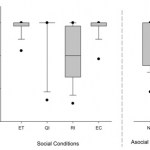
This week is Social Media Week in Los Angeles, as well as in Mexico City, Milan, Bogota, and Buenos Aires.
What does that mean, exactly?
Social Media Week is a multi-city global conference connecting people, content and conversations around emerging trends in social and mobile media. Dozens of free events hosted at locations all over the city will bring together CEO's, entrepreneurs, journalists, bloggers, brand managers, CMO's, social media strategists, artists, activists and the technology/media digerati. Across a wide range of topics, industries and causes and with nearly 70 events…
We initially planned on doing these group blogcasts roughly once per month, but then, well, Pepsigate happened and blogs were moved, people were distracted, and so on. But the dust is finally starting to settle, so it was time for another. I should point out how awesome it is that this group blogcast spans three blog networks - Scienceblogs, Scientopia, and PLoS blogs - and is an example of the kind of collaboration the bloggers on the different networks can achieve!
We had initially decided to talk about field work, but there are, as expected, plenty of tangents: the work that we are…
Here are my Research Blogging Editor's Selections for this week.
Dr. Shock says that Internet and Video Games Improve Reading Skills and Visual Spatial Skills in Children. If the kids are initially low in those skills, at least.
At the Global Change blog: Do women and men differ in their acceptance of climate warming?
Religion messes with your mind, but not in the way you might think. BPS Research Digest explains how religion causes a chronic biasing of visual attention.
Finally, at Addiction Inbox: Sex, drugs, and...sex. Dirk Hanson considers sexual performance and pharmaceuticals.
Cooperation and conflict are both a part of human society. While a good deal of the academic literature addresses the evolutionary origins of conflict, in recent years there has been an increased focus on the investigation of the evolutionary origins of cooperative behavior. One component of cooperative behavior that might be present in other animals is aversion to inequity. Some scientists have suggested that inequity aversion may itself be the main factor driving the enforcement of cooperation. Put simply, inequity aversion is the resistance among partners to unequal rewards following…
Another week, another new blog network. Go say hello to the bloggers at Wired Science. Five of the six should look familiar, if you've been around Scienceblogs for a while: Brian Switek, David Dobbs, Daniel Macarthur, Maryn McKenna, Rhett Allain and Brian Romans, joined Jonah Lehrer, who had already been there a few weeks.
Science
Melody Dye and I discussed psychology on the Bloggingheads Science Saturday program yesterday.
The second edition of the Carnal Carnival is up at Carin Bondar's place, and the theme is vomit!
Christie Wilcox tells us that, apparently, the most highly cited academic…
My Child's Play co-blogger Melody and I are the subjects of today's Bloggingheads.tv Science Saturday program. Watch us chat with eachother for about an hour on how we became scientists and science bloggers, our thoughts on the state of psychology as a field, peer review and the journal system, how the study of language learning and comparative cognition may not be so different, and a smattering of other thoughts.
The schwag shop has opened!
Imagine how awesome your desk would look with a Thoughtful Animal mug on it. Need a bag to lug your books around in? Why not use a Thoughtful Animal tote bag?
Right now I've got some coffee/tea mugs, travel mugs, beer mugs, and water bottles available, as well as a few bags, and some coasters. What else do you want? Clothing? Fridge magnets? Aprons? Can coolers? Let me know and I'll add them to the shop.
All profits I make from the schwag shop will go to an animal conservation foundation or charity to be determined. Once there is enough to send, I'll run a poll on…
Quandaries such as those involving stealing a drug to save a spouse's life or whether or not to have an abortion have historically dominated the study of the development of moral thinking. The predominant research programs in psychology today use dilemmas in which one choice is deontologically correct (it is wrong to rotate a lever that will divert a train and kill one person instead of five), and the other is consequentially correct (kill one person if it will save five others).
It is not surprising that psychologists have followed philosophers in proposing definitions for morality that…
Figure 1: Deep sea coral. Click to awesomely embiggen!
Another awesome exclusive video from our friends over at BBC Life Is. This month, the theme is corals, and the video (behind the fold, since it takes up a decent amount of bandwidth) features an interesting new attempt in Fiji to restore coral reefs.
They write:
Home to a quarter of the planet's marine life, wonderfully weird-looking, and of course brilliantly colourful, coral reefs are often hailed as one of the greatest of the ocean's wonders.
Despite being the home to so much amazing underwater life, almost unbelievably reefs only…
Here are my Research Blogging Editor's Selections for this week.
"The relationship between leaders and followers reflects a social contract wherein followers trust leaders to make decisions that benefit the group and leaders agree to pursue actions that are in the group's best interests. The prevalence of leadership throughout history and across species suggests that leadership provides a stable strategy for effective group functioning." But what happens, Dr. Shock wonders, when leaders sacrifice group galls for the sake of self-interest?
Albert Einstein once (allegedly) mused, "Put your…
My contribution for the Guardian's Science Blogging Festival has been posted!
Healthy, sane humans do not stab themselves in the thighs, or bathe their eyes in lemon juice. So why do we so love to assault one of the most sensitive organs in the human body, the tongue, with what amounts to chemical warfare? Chillies are unique among foods that we should otherwise not enjoy. For example, humans also have natural aversions to the bitterness of coffee or the harshness of tobacco, but those substances have some addictive qualities, which might make them desirable. Capsaicin, the compound that…
At least one dog can be found in forty percent of US households, and forty percent of those owners allow their dogs to sleep on their beds. To put this in perspective, in a family with five children, two of them can be expected to become dog owners, and one of them will probably allow the dog to sleep on his or her bed. In an undergraduate lecture class of two hundred, eighty of those students come from homes with at least one pet dog. So as you might expect, dogs are a big business! In 2007, the pet industry was worth about $40 billion in the US, with dogs responsible for the largest share…
There was A LOT of stuff this week. Was this week particularly good for blogging or am I just aware of more blogs and blog posts in recent weeks? Am I paying more attention because of the new networks? Am I just filtering less, and including more in the round-up? Anyway, lots of awesome.
Science
I've really been enjoying the Replicated Typo blog lately. I particularly liked a recent post on the social sensitivity hypothesis: "Given findings that certain genetic variants will make a person more sensitive to social contact and more reliant on social contact under stress, it proposes that…
If I had to describe the mission, the point, the raison d'etre of the entire field of psychology in just one sentence, I would say: Psychology aims to determine the relative extents to which biology and experience determine cognition and behavior." And, as you might expect, there are widely differing schools of thought. Nativists emphasize genetics, biology, and innate mechanisms. By contrast, the empiricists insist that babies are born into the world with no a priori knowledge thereof, and just a powerful statistical associative learning mechanism by which they piece together their…
This talk, from last spring's TEDxUSC (for those not in the know, USC held the first ever TEDx event, in 2009), is made of awesome, and worth watching in its entirety. It will be especially interesting for those who have read The Invisible Gorilla.
As I'm always looking for good teaching tips, here are a few good things that the presenter, Al Seckel, did.
1. His powerpoint, with few exceptions, is mostly not-text. When there is text, it is limited to just a few bulletpoints. (this is true until the last 3-4 minutes, when it gets too text-heavy)
2. He uses still images, videos, audio, and…
Here are my Research Blogging Editor's Selections for this week:
"Now, five years later, there's new evidence of the significant, negative impact of Hurricane Katrina on children's mental health." Many Children Still Haven't Recovered from Katrina.
"Congenital amusia is one of several different types of music perception impairments. A person with the disorder is born with a variety of symptoms, including an inability to recognize a familiar song without hearing the lyrics, an inability to discern the difference between two melodies, and difficulty perceiving when he or she is singing or…
New-born twin giant pandas made their media debut at a zoo in Japan on Friday. The twins, one male and one female, were born on August 11 to mother Rauhin and father Eimei, by artificial insemination. (video via BBC News)
For today's dose of monday pet blogging, head on over to a piece that I wrote for Scientific American that went up today. I used the invitation as an opportunity to a dig a little deeper into the story of Belyaev and his domesticated silver foxes (I previously wrote about them, here and here)
Links, links, and more links. Lots of good stuff this week.
Science
Brains and Beauty: a three-movement concerto was written inspired by a poem written by neuroscientist Antonio Damasio, and set to images culled from the research of Hanna Damasio.
How does beer become whiskey? At the Guardian Science blog, Andy Connelly describes this delicious transformation.
Fascinating musings on comparative medicine from our friends over at the Dog Zombie. What is a wallaby?
Blog bff Scicurious writes about PCR - a technique that shouldn't work, but does.
In the NY Times, Carl Zimmer has probably the…









